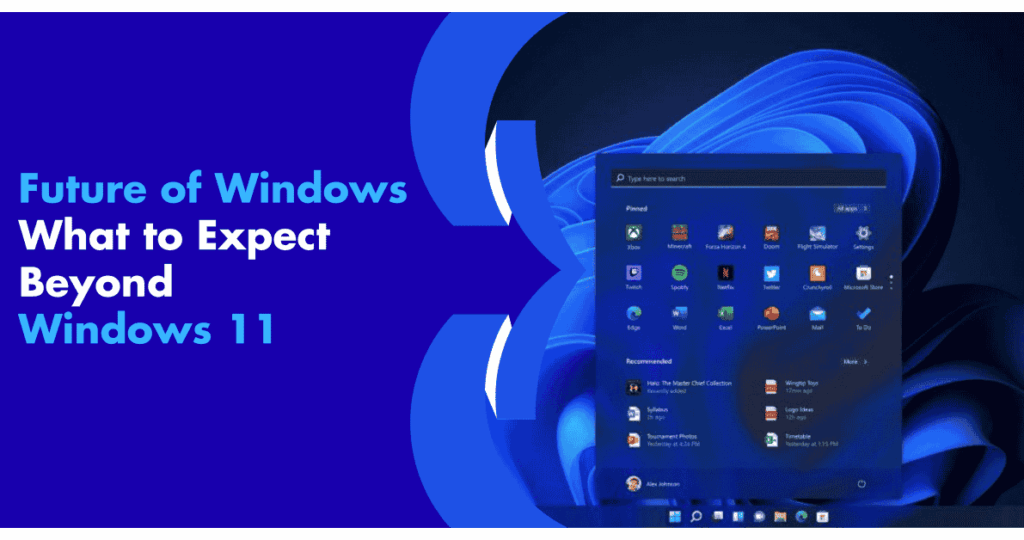The Evolution of Microsoft Windows
Since its debut in 1985, Microsoft Windows has defined the personal computing era. From the classic Windows 95 start menu to the sleek design of Windows 11, every version has brought innovation while shaping the way millions of people work, play, and connect.
But technology never stands still. As we look to the future of Windows, many wonder: What comes after Windows 11? Will Microsoft release Windows 12, or will it move toward a completely new operating model?
Table Of Content
- Where Windows 11 Stands Today
- AI Integration in the Next Version of Windows
- Cloud-Powered Operating Systems
- Security Enhancements in the Future of Windows
- Gaming on the Next Windows
- Productivity and Collaboration Features
- The Role of Mixed Reality and Holographic Computing
- Challenges Ahead for Microsoft Windows
- Future of Windows in a World of Competing OS
Where Windows 11 Stands Today
Windows 11, released in 2021, introduced a redesigned interface, enhanced multitasking, stronger security, and deep integration with Microsoft Teams. With frequent updates, it continues to evolve. However, the industry is already buzzing about what’s next for Windows.
Microsoft’s Vision for the Future of Windows
Microsoft’s stated mission is to create a cloud-connected, AI-powered, secure, and user-friendly platform. The next version of Windows will likely combine:
- AI-driven personalization
- Deeper cloud integration with Azure
- Enhanced gaming capabilities
- Tighter security and privacy controls
Windows 12: Rumors, Leaks, and Possibilities
Expected Release Timeline
Industry analysts expect Windows 12 (or its equivalent) to launch around 2025, following Microsoft’s new three-year release cycle.
Possible Design Enhancements
Future versions may feature:
- A modular design allowing custom builds for gaming, business, or education.
- An even more streamlined UI with dynamic widgets and adaptive layouts.
Hardware Requirements and Compatibility
Windows 11’s strict hardware requirements caused controversy. Expect Microsoft to refine these, potentially requiring even more AI-optimized processors and TPM security chips.
AI Integration in the Next Version of Windows
Windows Copilot Expansion
The Copilot AI assistant, introduced in Windows 11, will likely become a central hub in future Windows versions—helping with everything from file management to app integration.
AI-Driven Personalization and Automation
- Expect AI that learns user behavior, predicting needs like:
- Automatically arranging workspaces.
- Suggesting shortcuts.
- Automating repetitive tasks.
Smarter Security with AI Threat Detection
AI will play a crucial role in real-time malware detection, phishing prevention, and ransomware defense.
Cloud-Powered Operating Systems
Hybrid Local and Cloud Experience
Microsoft could blur the lines between local and cloud computing, allowing users to stream their personalized Windows desktop across devices.
Windows and Microsoft Azure Synergy
Deeper integration with Azure may enable enterprises to scale their operations effortlessly with cloud-hosted Windows environments.
Security Enhancements in the Future of Windows
Zero Trust Architecture
The next Windows may adopt Zero Trust Security, verifying every user and device before granting access.
Advanced Encryption and Privacy Controls
Users will likely get more transparency over data usage and the ability to control permissions in a granular way.
Gaming on the Next Windows
DirectX Upgrades and Immersive Graphics
Windows remains the go-to platform for PC gaming. Expect major improvements in DirectX, ray tracing, and VR/AR gaming support.
Cloud Gaming Integration with Xbox Game Pass
Future versions may include seamless Xbox Cloud Gaming, allowing users to stream games without needing high-end hardware.
Productivity and Collaboration Features
Seamless Microsoft 365 Integration
Deeper AI and cloud connections will make apps like Word, Excel, and Teams feel like native extensions of Windows itself.
Next-Gen Virtual Desktops
Virtual desktop environments will become more powerful, enabling businesses and individuals to run multiple workflows effortlessly.
The Role of Mixed Reality and Holographic Computing
With HoloLens paving the way, the future Windows may integrate mixed reality (MR) experiences directly into the OS, making 3D collaboration and holographic meetings a reality.
Challenges Ahead for Microsoft Windows
Balancing Innovation with Compatibility
Microsoft must ensure new features don’t break older apps—a recurring pain point in past releases.
Adoption Barriers in Enterprises
Enterprises tend to adopt new Windows versions cautiously. Overcoming resistance will be crucial for widespread adoption.
Future of Windows in a World of Competing OS
Competing with macOS and Linux
Windows faces stiff competition from Apple’s ecosystem and the growing adoption of Linux in enterprise environments.
The Rise of Mobile-First Operating Systems
With more users relying on smartphones and tablets, Windows must evolve to stay relevant in a mobile-first, cloud-first world.
Final Thoughts
The future of Windows is heading toward an era defined by AI, cloud computing, tighter security, and seamless productivity tools. Whether it’s called Windows 12 or something entirely new, Microsoft’s next big step will likely reshape how we use PCs.
One thing is certain: Windows will continue to be at the heart of the computing experience, adapting to the needs of both individuals and businesses in a rapidly evolving digital world.
FAQs: Future of Windows Beyond Windows 11
Will Windows become fully cloud-based?
Not entirely—local installations will remain, but hybrid cloud functionality will play a bigger role.
Will there be a Windows 12?
Most likely, yes. Leaks suggest Microsoft is preparing a new version, expected around 2025.
Will AI be the main focus of the next Windows?
Yes, AI integration will expand significantly with Windows Copilot and personalized automation.
How will gaming improve in future Windows versions?
Expect DirectX upgrades, VR/AR support, and Xbox Cloud Gaming integration.
Will older PCs run future versions of Windows?
It depends. Microsoft may continue to raise hardware requirements to support advanced features.
How will Windows compete with macOS and Linux?
By focusing on gaming, enterprise tools, AI, and security, Microsoft aims to maintain its dominance.

